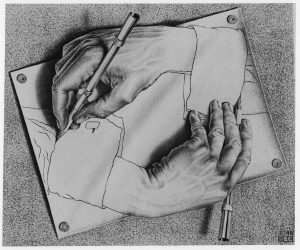In Waiting for Godot, Samuel Beckett’s two protagonists appear to be abandoned beside a country road, awaiting the arrival of someone, or something, called Godot. Despair and failure are central themes in the play, with Estragon and Vladimir succumbing to bored insanity in the face of a seemingly futile, meaningless world. From the moment the play commences, we are dropped into a state of limbo; Estragon is tries and fails twice to remove his boot, before declaring that there is “Nothing to be done.” Indeed, from this opening line onwards, nothing is done.

But what is Beckett aiming to convey with such a pessimistic portrayal of the world? We might first infer that Waiting for Godot is a reflection of the widespread nihilism that spread across the postmodern world; after the Second World War, many lost faith in the fundamental human values of reason and meaning, having witnessed the atrocities of the Holocaust. Estragon and Vladimir appear to be in some kind of post-apocalyptic setting, promoting us to make this connection. But perhaps more relevant than the nihilistic undertones of the play are its references to existentialism. The protagonists’ relentless faith that Godot will arrive and repetitive behaviour are reminiscent of the Myth of Sisyphus, which was used by existential philosopher Albert Camus to illustrate the absurdity of life. Sisyphus was condemned to endlessly repeat the meaningless task of pushing a boulder up a mountain, just as Estragon and Vladimir appear to have condemned themselves to the endless task of waiting for Godot; in both cases the situation is static. The final interaction closes the play while also opening it up to a perpetual looping:
ESTRAGON:
Well, shall we go?
VLADIMIR:
Yes, let’s go.
They do not move.
Curtain.
Camus concludes that “one must imagine Sisyphus happy,” since he must become contented with the absurdity of his task. But what about Estragon and Vladimir; in this reading of Beckett, can we conclude that his heroes are of Sisyphus kind, accepting of their fate? I would argue that it is unclear as to whether they have even become conscious of their perpetual task.

However, we may explore a further existential reading of Waiting for Godot: one that may get closer to Beckett’s intended message. In Being and Nothingness, Jean-Paul Sartre distinguishes two mutually exclusive kinds of being: the unconscious (being-in-itself), which is unchangeable and concrete in its essence; and the conscious (being-for-itself), which is aware of itself and changeable, but lacks a prescribed essence. For Sartre, the conscious being must create itself out of nothingness, since it lacks a predetermined essence; unlike a tree, which is fated to simply be a tree, humans act within the world and thus actualise their being. In Waiting for Godot, Estragon and Vladimir appear to have estranged themselves from such freedom and consciousness, instead opting for inaction and ceaseless waiting in a world full of nothing. But, unlike the tree that they stand beside, our protagonists may in fact possess the power to shape their own essence from this nothingness.

To our despair, we leave Estragon and Vladimir still fixated on the arrival of Godot, wherein their essence is estranged. They seem to be stuck in a ditch, unwilling to actuate their own being from the nothingness around them.
References:
Waiting for Godot, Samuel Beckett, 1953
The Myth of Sisyphus, Albert Camus, 1942
Being and Nothingness, Jean-Paul Sartre, 1943
Dear Harry,
Thank you very much for your exciting blog post, which I enjoyed reading.
If I have understood your argument correctly, you are looking at Samuel Beckett’s work Waiting for Godot with Sartre’s division into being-in-itself and being-for-itself. Nothingness is not described here as a pure state, but as a negotiated process between the protagonists, which is also related to understandings of value, knowledge and the world.
Best regards,
Manuel
I really wanted to thank you for this excellent and educational article you are presenting at this website. My extensive internet investigation has at the end of the day been recognized with awesome facts to talk about with my friends. I feel lucky to have come across the website and look forward to spend more excellent reading time here. Thanks a lot once again for all the details. Reply from All Shops Business Directory user.